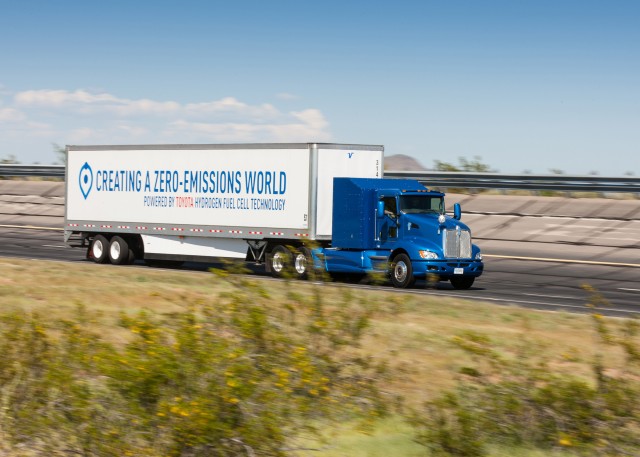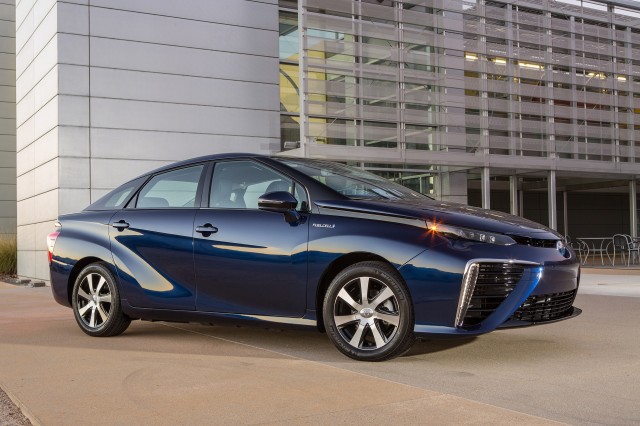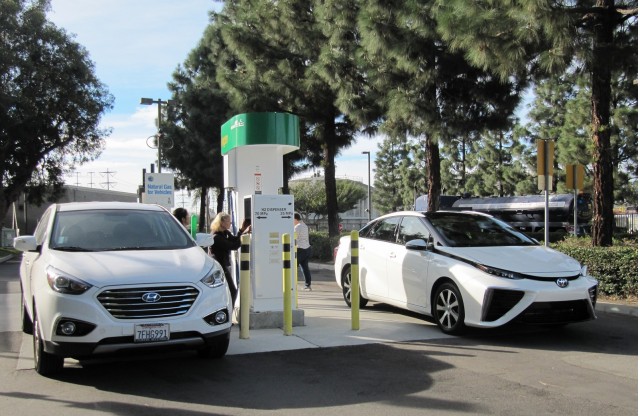Toyota today is the world's most ardent proponent of using hydrogen fuel cells for zero-emission vehicles rather than large battery packs.
The huge Japanese carmaker, one of the world's four largest, now sells its Toyota Mirai fuel-cell sedan around the world, and has more hydrogen-powered vehicles in development.
As it has discussed over the last year, some of those may be heavy trucks as well as passenger cars.
Any fuel-cell vehicle, of whatever size, requires a hydrogen fueling infrastructure to operate, however, and the carmaker has had to work consistently to help authorities and private companies deliver that infrastructure in California.
Toyota announced on Thursday that it would build a renewable energy and hydrogen generation plant at California's Port of Long Beach that uses bio-waste from California's huge agricultural industry to produce water, electricity, and hydrogen fuel.
It will be, the company says, the first such site in the world to operate at a scale of 1 megawatt.

Toyota 'Project Portal' proof-of-concept hydrogen fuel-cell powered semi tractor, for Port of LA
When it is fully operational, the so-called Tri-Gen plant will generate more than 2 megawatts of electricity and 1.2 tons of hydrogen fuel a day.
That amount of electricity will power 2,350 average homes, and that quantity of hydrogen fuel will cover the daily drives of almost 1,500 hydrogen vehicles, which hold roughly 5 kg of fuel compressed to 10,000 psi.
The electricity will supply operations by Toyota Logistics Services at the Port, which will become the first Toyota facility in North America running entirely on renewable energy.
“For more than 20 years, Toyota has been leading the development of fuel cell technology," said Doug Murtha, the company's group vice president for strategic planning, "because we understand the tremendous potential to reduce emissions and improve society."
Among the vehicles to be fueled at the site will be the Toyota "Project Portal" heavy-duty Class 8 hydrogen truck to be tested in port operations.
All Toyota Mirai sedans will also be fueled at the station once they're unloaded from the ships that have brought them to North America from the car's single assembly plant in Japan.

2017 Toyota Mirai
California's ports have long sought to reduce emissions from thousands of idling diesel tractors and specialized yard trucks; a zero-emission hydrogen truck would contribute to that effort.
They have numerous projects underway to test fully electric, plug-in hybrid, and other fully or partially zero-emission vehicles to reduce or eliminate exhaust from the vehicles operating within the ports and hauling freight to and from them.
The new Tri-Gen plant has been developed by FuelCell Energy. Among entities that have supported it development are the U.S. Department of Energy, the California Air Resources Board, South Coast Air Quality Management District, Orange County Sanitation District, and the University of California at Irvine, where researchers developed some of the core technologies used at the site.
To date, Toyota has delivered roughly 2,400 Mirai fuel-cell sedans in the U.S. It is one of two hydrogen-powered vehicles on sale in the U.S., the other being the Honda Clarity Fuel Cell sedan.
California now has 31 fully operative retail hydrogen fueling stations, with more planned to bring the total to 100 by 2020.
Thus far, about 3,000 fuel-cell vehicles in total are operating on U.S. roads, all delivered within carefully defined areas of California where hydrogen fueling stations are near buyers' homes and workplaces.




No comments:
Post a Comment